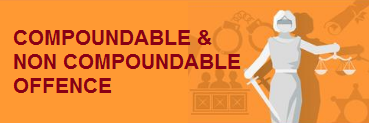Compoundable offences
Compoundable offences are those offences
where, the complainant enter into a compromise, and agrees to have the charges
dropped against the accused.
· (complainant is the one who has filed the case, i.e. the
victim), However, such a compromise, should be a "Bonafide," and not
for any consideration to which the complainant is not entitled to.
Section 320 of the CrPC looks at compounding of offences
Compoundable
offences are less serious criminal offences and are of two different types
mentioned in tables in Section 320 of the CrPC, as follows:
- Court permission is not required before compounding – Examples of these offences include adultery, causing hurt, defamation criminal trespass.
- Court permission is required before compounding – Examples of such offences are causing miscarriage, voluntarily causing grievous hurt, Criminal breach of trust, Marrying again during the life-time of a husband or wife, assault on a woman with intention to outrage her modesty, dishonest misappropriation of property amongst others.
Application for compounding the offence shall be made before the same court before which the trial is proceeding. Once an offence has been compounded it shall have the same effect, as if, the accused has been acquitted of the charges.
Non Compoundable offences
Non- Compoundable offences are
some offences, which cannot be compounded. They can only be quashed.
The reason
for this is, because the nature of offence is so grave and criminal, that the
Accused cannot be allowed to go scot-free.
- In these types of cases generally, it is the "state", i.e. police, who has filed the case, and hence the question of complainant entering into compromise does not arise.
- Under a non-compoundable offense, a private party as well as the society, both are affected by such offenses. All those offences, which are not mentioned in the list under section (320) of CrPC, are non-compoundable offences.
- In Non-compoundable offense, no compromise is allowed.
- Even the court does not have the authority and power to compound such offense. Full trail is held which ends with the acquittal or conviction of the offender, based on the evidence given.If a non-compoundable offence has been compounded, against the law and the accused has be
- en acquitted based on the same compromise, the High Court has the power to set aside such an order.
Power of High Court under section 482 of CrPC:
Section 482 of CrPC gives the High Court inherent powers to deal with matters
in order to;
- to give effect to any order
under CrPC, or
- to prevent abuse of the
process of any Court or
- to secure the ends of justice.
If the crime is serious in nature and has a grave impact on the society,
the High Court is empowered to quash the proceedings even if the parties have
arrived at a compromise.
A High Court or Court of Session acting in the exercise of its powers of revision under section 401 may allow any person to compound any offence which such person is competent to compound under this section.
If it is a civil matter, the wrong is personal in nature and if the parties
have resolved the dispute by way of a compromise then the proceedings may be
quashed.
No offence shall be compounded if the accused is, by reason of a previous conviction, liable either to enhanced punishment or to a punishment of a different kind for such offence.
we shall understand it better in the chart given below with the offences


No comments:
Post a Comment